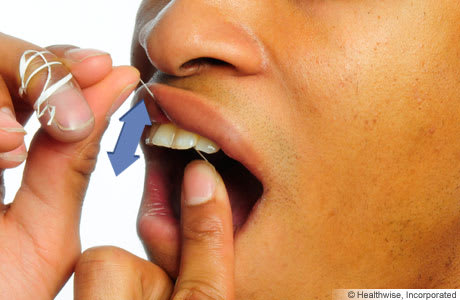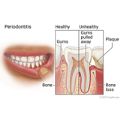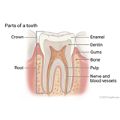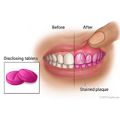Our Health Library information does not replace the advice of a doctor. Please be advised that this information is made available to assist our patients to learn more about their health. Our providers may not see and/or treat all topics found herein.
Basic Dental Care
What is basic dental care?
Basic dental care involves brushing and cleaning between or flossing your teeth regularly to remove plaque. Plaque is a thin film of bacteria that sticks to teeth above and below the gum line. It can build up and harden into tartar, which makes it harder to give the teeth a good cleaning. Tartar usually has to be removed by a dental hygienist.
The bacteria in plaque use sugars to make acids. These acids can damage the gums and teeth.
Be sure to see your dentist and dental hygienist for regular checkups and cleanings.
Why is basic dental care important?
Practicing basic dental care:
- Prevents tooth decay.
- Prevents gum (periodontal) disease. Gum disease can damage gum tissue and the bones that support teeth and, in the long term, it can lead to the loss of teeth.
- Shortens time with the dentist and dental hygienist, and makes the trip more pleasant.
- Saves money. By preventing tooth decay and gum disease, you can reduce the need for fillings and other costly procedures.
- Helps prevent bad breath. Brushing and cleaning between your teeth or flossing rid your mouth of the bacteria that cause bad breath.
- Helps keep teeth white by preventing staining from food, drinks, smoking, vaping, and using other tobacco and nicotine products.
- Improves overall health.
- Makes it possible for your teeth to last a lifetime.
What can you do to prevent dental problems?
Brush your teeth twice a day, and floss at least once a day.
Replace your toothbrush every 3 to 4 months.
Choose a toothbrush with soft bristles.
Use a fluoride toothpaste.
Follow your dentist's directions on how to brush your teeth.
Go to all your regular dental checkups and cleanings.
Choose healthy foods that are good for your teeth and gums, such as whole grains, vegetables, and fruits.
Avoid foods and drinks that contain a lot of sugar, and try not to snack before bedtime.
Avoid smoking, vaping, or using other tobacco or nicotine products, and talk to your doctor if you need help quitting.
Common Concerns
Here are some common concerns people have about what might happen at the dentist's office.
- Will a routine visit hurt? If you go to the dentist regularly and take good care of your teeth, there will probably be no pain. If this is your first visit in a long time, or you do not brush or floss regularly, there may be some irritation as the dentist cleans the spaces between your teeth and between your teeth and gums.
- Will I need a filling? A filling is a substance that dentists use to replace a decayed or broken portion of a tooth. A filling is often needed to fix a cavity. If you brush and floss on a regular basis and limit how much sugar you eat, you have a better chance of not needing a filling.
- Will I need dental X-rays? Dental X-rays can identify cavities, bone disease, and infections and help in planning orthodontic treatment. In children, they can also identify when new teeth are coming in. X-rays can help your dentist find problems at an early stage, which can save you time, money, and unneeded pain or discomfort. You and your dentist will set up an X-ray schedule based on your needs.
Learn more
Routine Checkups
When your child should start seeing a dentist
Experts recommend that children start going to the dentist after the first tooth comes in or by their first birthday, whichever comes first. Babies with dental problems caused by injury, disease, or a developmental problem should be seen by a children's (pediatric) dentist right away. If these dental problems aren't limited to the surfaces of the teeth, the baby should also be seen by a children's doctor (pediatrician) or a family doctor.
After your child's first visit, schedule regular visits every 6 months or as your dentist recommends.
Checking your teeth and gums
Your dentist will recommend how often to have routine checkups. Many people should see their dentist twice a year. Your dentist will check your teeth and gums for signs of tooth decay, gingivitis, and mouth cancer.
- Your dental hygienist will clean your teeth by removing hard mineral buildup (tartar) off of your teeth with a small metal tool. Then the hygienist will floss your teeth and use a polishing compound. Cleanings usually aren't painful.
- Occasionally your dentist will want to take X-rays. The X-rays take only a few minutes.
- Your dental hygienist will have you put on a heavy apron to shield your body from X-rays. Everyone else in the room will either wear a protective apron or step behind a protective shield. Let your dental hygienist and dentist know if you are pregnant.
- Your dental hygienist will have you bite down on a small piece of plastic. This will help align the teeth properly for the machine. Your dental hygienist will repeat this process several times to get pictures of all your teeth.
- If needed, your dental hygienist will put a sealant on the chewing surface of your back teeth to help prevent cavities. Sealants keep food and bacteria from getting stuck in the rough chewing surfaces or grooves of your teeth, and they protect your teeth from plaque.
- Your dental hygienist may apply a fluoride solution directly to your teeth to help prevent tooth decay. Your dentist may recommend a series of fluoride applications.
- Your dentist or hygienist may ask you about the foods you eat. What you eat and whether you get enough vitamins and minerals can affect your dental health.
- If you have active tooth decay or gum disease, your dentist will talk to you about changing your brushing or flossing habits. In severe cases, the dentist may recommend antibiotics, special mouthwashes, or other dental treatments. If your teeth and gums appear healthy, your dentist will recommend that you continue your usual brushing and flossing.
Preparing for a dental checkup when you have a health problem
If you are prone to infections, or if infections are particularly dangerous for you, you may need to take antibiotics before you have some types of dental work. Talk to your dentist or doctor if you have questions about the need for antibiotics. You may need to take antibiotics if you:
- Have certain heart problems or have had certain heart procedures. These include:
- A replaced or repaired heart valve.
- Endocarditis.
- Heart defects since birth.
- Heart valve problems after a heart transplant.
- A left atrial appendage closure.
- Have had your hip, knee, or shoulder replaced. Your doctor may want you to take special precautions if you are at high risk for infection.
Learn more
Self-Care
Brush daily
Brush your teeth 2 times a day, and use a toothbrush with soft bristles. Follow these tips when you brush your teeth.
- Place the brush at a 45-degree angle where the teeth meet the gums.
- Press firmly, and gently rock the brush back and forth using small circular movements. Don't scrub. Vigorous brushing can make the gums pull away from the teeth and can scratch your tooth enamel.
- Brush all surfaces of the teeth. Make sure you get the inner, outer, and top sides of all your teeth.
- Consider brushing your tongue. Some people think it makes their mouth feel more fresh, but there is no evidence that it will help with bad breath.
- Use a fluoride toothpaste. Some fluoride toothpastes also offer tartar control, which may help slow the formation of hard mineral buildup (tartar) on the teeth.
- Use disclosing tablets every now and then to see whether any plaque remains on the teeth. Disclosing tablets are chewable and will color any plaque left on the teeth after you brush. You can buy them at most drugstores.
Floss daily

With either method, follow these steps for flossing.
- The finger-wrap method. Cut off a piece of floss 18 in. (46 cm) to 20 in. (51 cm) long. Wrap one end around your left middle finger and the other end around your right middle finger, until your hands are about 2 in. (5 cm) to 3 in. (8 cm) apart.
- The circle method. Use a piece of floss about 12 in. (30 cm) long. Tie the ends together to form a loop. If the loop is too large, wrap the floss around your fingers to make it smaller.
Floss at least one time a day. Choose the type and flavor of floss that you like best. When you floss your teeth, use either of these methods.
- Gently work the floss between the teeth toward the gums.
- Curve the floss around each tooth into a U-shape and gently slide it under the gum line.
- Move the floss firmly up and down several times to scrape off the plaque. Popping the floss in and out between the teeth without scraping won't remove much plaque. And it can hurt your gums.
A plastic flossing tool makes flossing easier. Child-size flossing tools are available for parents to use to floss their children's teeth. You can buy them at most drugstores. If your gums bleed when you floss, the bleeding should stop over time as your gums get healthier and tighter next to your teeth.
Other ways to keep your teeth and mouth healthy
Developing good dental health habits is the best way to prevent tooth decay and gum disease. Along with brushing and cleaning between or flossing your teeth every day, there are other things you can do to keep your teeth and mouth healthy.
- Eat a mouth-healthy diet.
- Eat a variety of healthy foods, like fruits, vegetables, whole grains, dairy, and lean protein foods. Good nutrition is important to maintaining healthy gums and avoiding tooth decay.
- Avoid foods and drinks that contain a lot of sugar.
- Try to avoid snacking between meals. If you do snack, try to pick something healthy, such as yogurt, fruit, or nuts.
- Avoid smoking, vaping, or using other tobacco and nicotine products. Using any tobacco or nicotine product makes it more likely that you will have mouth cancer or gum disease. Using these products can also delay healing after you have a tooth pulled or other surgery on your teeth or mouth. Using these products also causes bad breath and stains your teeth and tongue. If you need help quitting, talk to your doctor.
Learn more
Caring for Your Child's Teeth and Gums
It's best to start good oral health habits before permanent teeth come in. Along with brushing and flossing teeth every day, here are some other important things you can do to care for your child's teeth and gums.
- Discuss your child's fluoride needs with your dentist or doctor. If your child needs extra fluoride, the dentist or doctor may recommend a supplement or a gel or varnish that they would apply to your child's teeth. Use supplements only as directed. And keep them out of reach of your child. Too much fluoride can be toxic and can stain a child's teeth.
- Talk with your dentist about having dental sealant placed on the molars, after your child's permanent teeth begin to appear. Dental sealants are made of hard plastic and protect the chewing surfaces of the back teeth from decay.
- Give your child nutritious foods to maintain healthy gums, develop strong teeth, and avoid tooth decay. Have your child eat a variety of healthy foods, like fruits, vegetables, whole grains, dairy, and lean protein foods. Avoid foods and drinks that have a lot of sugar.
- Do not give your child mouthwashes that contain alcohol. If your child age 6 or older has cavities, ask the dentist if your child should try mouthwash that contains fluoride. But watch to make sure that your child doesn't swallow it.
- Keep your child away from secondhand smoke and the aerosol mist form vaping. They may contribute to the development of tooth decay, gum disease, and other health issues. As your child grows, teach them about the dangers of smoking, vaping, and secondhand smoke and aerosols.
- Learn how to prevent injuries to teeth and what to do in a dental emergency. Children play hard, sometimes hard enough to knock out or break a tooth.
Brushing and flossing
Here are some tips for children's dental care.
- Use a soft cloth to clean your baby's gums. Start a few days after birth, and do this until the first teeth come in.
- Start caring for your child's teeth as soon as you see the first baby (primary) tooth. Brush your child's teeth twice a day using a small, soft brush. If your child is younger than 3 years, ask your dentist if it's okay to use a rice-sized amount of fluoride toothpaste. Use a pea-sized amount for children ages 3 to 6 years. Teach your child not to swallow the toothpaste.
- Start flossing your child's teeth as soon as they touch each other. You may find plastic flossing tools helpful. Talk with your dentist about the right timing and technique to floss your child's teeth and how to teach your child to floss.
- Brush and floss your child's teeth for the first few years, until your child can do it alone. Your child can learn how to brush their teeth at about age 3. But you should help and check for proper cleaning. You don't need to supervise your child anymore when they spit toothpaste out instead of swallowing it and when they can tie their own shoes or write their own name. This may not be until age 8 or older.
- Encourage your child to watch you brush your teeth at a proper angle, so your child knows how to brush the right way. A good teaching method is to have your child brush their teeth in the morning and you brush your child's teeth at night until your child masters the skill.
- From time to time, you may want to use disclosing tablets. Disclosing tablets are chewable tablets that color any plaque that remains after brushing. You can get these tablets at most drugstores.
- If your child age 6 or older has cavities, ask the dentist if your child should try mouthwash. Do not give your child a mouthwash that contains alcohol. The alcohol can be harmful if swallowed.
Learn more
Related Information
Credits
Current as of: September 30, 2025
Author: Ignite Healthwise, LLC Staff
Clinical Review Board
All Ignite Healthwise, LLC education is reviewed by a team that includes physicians, nurses, advanced practitioners, registered dieticians, and other healthcare professionals.
Current as of: September 30, 2025
Author: Ignite Healthwise, LLC Staff
Clinical Review Board
All Ignite Healthwise, LLC education is reviewed by a team that includes physicians, nurses, advanced practitioners, registered dieticians, and other healthcare professionals.
This information does not replace the advice of a doctor. Ignite Healthwise, LLC disclaims any warranty or liability for your use of this information. Your use of this information means that you agree to the Terms of Use and Privacy Policy. Learn how we develop our content.
To learn more about Ignite Healthwise, LLC, visit webmdignite.com.
© 2024-2025 Ignite Healthwise, LLC.












